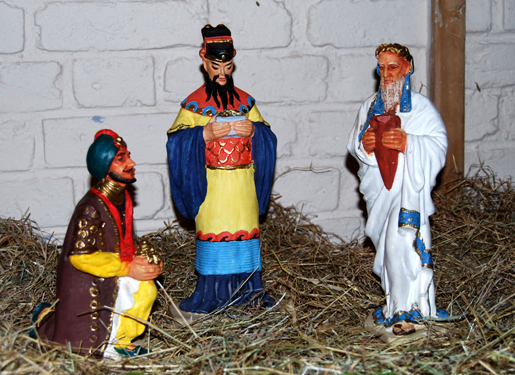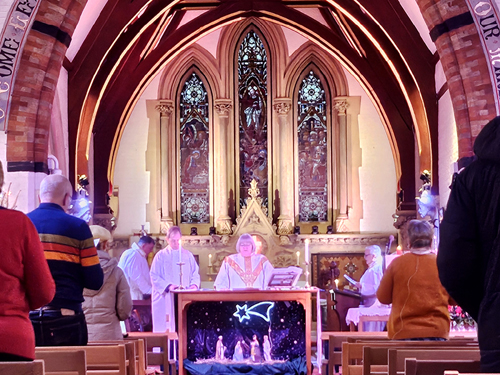
Pages in this section: Church Year | Advent | Christmas | Epiphany | Candlemas | Lent | Ash Wednesday | Mothering Sunday | Palm Sunday | Maundy Thursday | Good Friday | Holy Saturday | Easter | Ascension Day | Pentecost | Trinity Sunday | St James's Day | Harvest Festival | All Saints' Day & All Souls' Day | Remembrance Sunday
The Feast of the Epiphany is on January 6th and the season of Epiphany extends from January 6th until February 2nd which is Candlemas, the Presentation of Christ in the Temple. The name Epiphany comes from the Greek epiphaneia meaning to show or appear. Epiphany is the time when we celebrate the appearance of the Magi (wise men or kings) bringing gifts for the Christ Child. The Church Colour for the Season of Epiphany is white (or gold) which represents the light, joy and purity of Christ.
Background
Epiphany begins with the Feast of the Epiphany as Christ is shown to the wise men and, through them, to the gentile (non-Jewish) world. Through the gentiles, Christ is seen as being revealed to the whole world and for all people. The Magi (some think they may have been Astrologers), traditionally named Caspar, Melchior and Balthasar, brought gifts for the Christ Child. Although Epiphany is now associated with the arrival of the Magi, in the beginning the festival was connected more with Jesus' baptism and also with the story of the Wedding at Cana where Jesus turned water into wine. Nowadays the usual thing is to remember the gifts which the Magi brought to Jesus, gold, frankincense and myrrh. There is no record of how many Magi there were, but it is generally thought that there were only three because of the three gifts mentioned.
The early church saw each of the gifts as representing different aspects of Jesus' life:
• Gold - a valuable metal suitable for a king, reminding us that Jesus is King of Kings.
• Frankincense - a sweet smelling incense used in the temple to worship God reminding us that Jesus is the son of God.
• Myrrh - a fragrant spice put on dead bodies before they were buried, reminding us that Jesus was to die so that he could be our Saviour.
Epiphany is about more than the Magi, though, and we have a cycle of 'Sundays of the Epiphany' ending with the Presentation of Christ in the Temple or Candlemas on February 2nd. During this cycle other ways are remembered in which Christ was manifested. The first Sunday following the Epiphany is always the 'Baptism of Christ'. Jesus was baptised by John the Baptist in the river Jordan and a voice was heard proclaiming him to be God’s Son.
Find out more
Epiphany Season (service booklet)
 |
 |
 |